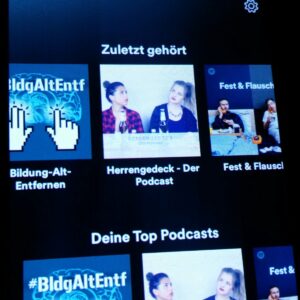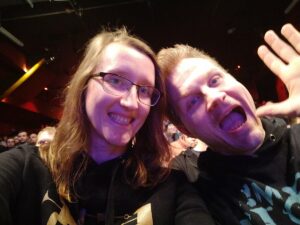
 Bildung-Alt-Entfernen
Bildung-Alt-Entfernen BldgAltEntf E013: Scheißhausbongo
Die Folge haben wir am 15.02.2018 aufgenommen.
Intro & Feedback
Wenn man das akademische Viertel mal abzieht, dann passt unser Intro natürlich hervorragend zum Valentinstag.
Mit der letzten Episode haben wir für David unseren neuen Service ausprobiert: Instant Service Reading. Im P2P-Hörertreffen mit Julian hat O herausgefunden, dass wir dank A bei Spotify nun in den großen Clubs spielen… ok, da auch eher vor dem Hinterausgang, aber isso!

„In einer Reihe“ mit Fest & Flauschig und Herrengedeck!!!
Und dank Arnim haben wir nun auch eine Idee für eine „Sag was am Anfang und löse es gegen Ende auf“-Kategorie: wir werden Bildungsmythen vorstellen – oder Dinge, die doch keine Mythen sind.
News+Alt+Entf

A und O inkorrekt live
News+O
- O würde seinen „Urlaub“ in Hamburg fast in vollen Zügen genießen, wenn da nicht diese(r) nervige(n) Identitätsdieb(e) wären – oder Plattformen, die mit Neukunden sehr großzügig umgehen.
- A und O haben sich mittlerweile schon „in echt“ wieder gesehen: bei der großartigen Live-Show von Methodisch Inkorrekt in Hamburg!
News+A
- Bei oncampus fand das traditionelle Jahres-Kick-Off statt, bei dem es u.a. mehrere Stationen zum Ausprobieren von ganz verschiedenen Sachen gab (wie damals in Naumburg/Hessen bei verdi). Außerdem gibt es jetzt Merch-Kram von oncampus.
- Es gibt jetzt ein neues Buch „Digitale Schule: Was heute schon im Unterricht geht“ von Jöran, A war auf der zünftigen Buch-Release-Party. Jöran hat darüber auch in seinem Podcast Jöran-Ruft-An Episode 88 drüber gesprochen.
- A hat für die EMOOCs 2019 ein paar Einreichungen begutachtet, fand Helene Bockhorst live in Lübeck sehr lustig und hat die Live-Show von Methodisch Inkorrekt auch sehr genossen.
Paper+Alt+Entf
Paper+O: Ist das Pädagogik oder kann das weg?
Kaynardağ, Aynur Yürekli
Pedagogy in HE: does it matter? Artikel
In: Studies in Higher Education, Bd. 44, Nr. 1, S. 111–119, 2017, ISSN: 1470-174X.
@article{Yuerekli17,
title = {Pedagogy in HE: does it matter?},
author = {Aynur Yürekli Kaynardağ},
url = {https://doi.org/10.1080/03075079.2017.1340444},
doi = {10.1080/03075079.2017.1340444},
issn = {1470-174X},
year = {2017},
date = {2017-06-19},
urldate = {2019-02-16},
journal = {Studies in Higher Education},
volume = {44},
number = {1},
pages = {111–119},
publisher = {Routledge},
abstract = {Pedagogical competencies of instructors play a crucial role in improving the quality of the teaching and learning in higher education institutions. However, in many countries worldwide, pedagogical training is not a requirement for being an instructor at a university [Postareff, L., S. Lindblom-Ylänne, and A. Nevgi. 2007. “The Effect of Pedagogical Training on Teaching in Higher Education.” Teaching and Teacher Education 23: 557–71; Badley, G. 2000. “Developing Globally-Competent University Teachers.” Innovations in Education and Training International 37 (3): 244–53]. This study explores how pedagogical competencies of instructors affect the perceptions of students by focusing on three key dimensions of classroom pedagogy; namely delivery (provision of content and facilitation), communication and assessment. The results of the scale administered to a total of 1083 university students suggests that there are meaningful differences in terms of students’ perceptions regarding their instructors’ pedagogical competencies. The greatest difference is reflected in the ratings of items related to the communication dimension.},
keywords = {},
pubstate = {published},
tppubtype = {article}
}
Lehrende an Hochschulen in Deutschland brauchen keine pädagogisch-didaktische Ausbildung, um Lehren zu dürfen. Im Paper geht Aynur Yürekli Kaynardağ der Frage nach, ob es grundsätzlich trotzdem sinnvoll sein könnte, sich mit Hochschuldidaktik zu beschäftigen – sprich: ob es bei diversen Kriterien “guter Lehre” messbare Unterschiede zwischen Lehrenden mit und ohne pädagogisch-didaktische Kenntnisse gibt.
Wiki+A: Submitted 1543, rejected 1616
Wikipedianer,
Nikolaus Kopernikus Online
Wikipedia 2018, besucht am: 16.02.2019.
@online{Wikipedia2019Kopernikus,
title = {Nikolaus Kopernikus},
author = {Wikipedianer},
url = {https://de.wikipedia.org/w/index.php?title=Nikolaus_Kopernikus&oldid=184010871},
year = {2018},
date = {2018-12-25},
urldate = {2019-02-16},
organization = {Wikipedia},
keywords = {},
pubstate = {published},
tppubtype = {online}
}
Klexikonianer,
Nikolaus Kopernikus Online
2018, besucht am: 16.02.2019.
@online{Klexikon2019Kopernikus,
title = {Nikolaus Kopernikus},
author = {Klexikonianer},
url = {https://klexikon.zum.de/index.php?title=Nikolaus_Kopernikus&oldid=83283},
year = {2018},
date = {2018-10-28},
urldate = {2019-02-16},
keywords = {},
pubstate = {published},
tppubtype = {online}
}
Der Sommerurlaub führte A in letztem Jahr nach Thorn und Frauenburg in Polen, und sie hat dort viel über Nikolaus Kopernikus erfahren. Nachhaltig beeindruckt war sie von einer Kopie seines Doktordiploms, das in seinem Geburtshaus ausgestellt war: während aktuell über digitale Kompetenznachweise wie Badges oder Blockchain-gesichterte Zertifikate diskutiert wurde, reichte Anfang des 16. Jhd. offenbar ein etwa A5-großer Zettel (den die meisten ohnehin nicht lesen konnten).
Neben den beiden „Nikolaus Kopernikus“-Seiten im Klexikon und der Wikipedia hat sich A auch durch diese Wiki-Seiten gelesen:

Milch, Eier, ein Doktortitel…
Fundgrube+Alt+Entf
Projekte, Tools, Apps… das sind doch bürgerliche Kategorien. Wir packen einfach alles in die Fundgrube:
- In der Stavanger–Erklärung haben 130 Leseforscherinnen und -forscher Studien zum Lesen auf Papier und auf dem Bildschirm ausgewertet. In der Erklärung betonen sie, auch im Zeitalter der Digitalisierung, dass Papier als Medium für lange Informationstexte besser geeignet seien. Leider fehlt es (noch) an einer Publikation der Untersuchungsmethodik und -ergebnisse. Bisher wird lediglich die Erklärung selbst diskutiert.
- Mit LyricsTraining kann man im Web oder Via App Hörverstehen üben, indem man Texte in Liedern erkennt.
Politik+Alt+Entf
- Bereits in den Episoden 5, 6, und 12 haben wir über die geplante Urheberrechtsreform der Europäischen Union gesprochen. Nun gibt es einen Entwurf, der im März abgestimmt werden soll. Anja und Olli haben den deutschen Abgeordneten im EU-Parlament geschrieben, warum sie diesen Entwurf nicht gut finden, und ihre Mailtexte in ihren Blogs veröffentlicht. Du kannst das auch tun: hier gibt es eine Textvorlage und die Kontaktadressen der Abgeordneten.
- Nochmal Gutes kann man tun, indem man dafür sorgt, dass alte Abituraufgaben frei zur Verfügung stehen. Durch die gemeinsame Kampagne „Frag Sie Abi!“ von FragDenStaat und Wikimedia geht das sehr bequem und schnell.
- SPIEGEL ONLINE hat Bildungsministerin Anja Karliczek als „die Unsichtbare“ betitelt. Leider hat wohl auch die letzte Berufsbachelor mitbekommen, dass man Studien über Kinder, die in gleichgeschlechtlichen Beziehungen aufwachsen, bereits heute an jeder Milchkanne bekommen kann, dass die Azubi-Mindestvergütung nicht brutto wie netto ist und dass das Bafög keine Almosen für Studis im Stadtrand sein darf.
Veranstaltungstipps
- 9. bis 23. Februar 2019: Didacta(#didacta oder #didacta19) in Köln
Vom 19. bis 23. Februar findet in Köln die Messe für alle Beutelratten im Bildungssektor statt. Ausgestattet mit Rollkoffer und Jutebeutel können Bildungsbegeisterte wieder von Stand zu Stand pilgern und Goodies von Verlagen und anderen Anbietern abgreifen. Wir freuen uns schon auf vielleicht neue Videos von TimeTex. Im Gegensatz zur Learntec gibt’s auch kostenloses WLAN ohne eigene App! - 18.03.2019: BarCamp Open Science (#oscibar) in Berlin
Früher war es das BarCamp „Science 2.0“, nun machen sie es richtig: Zu diesem BarCamp treffen sich Menschen, die wissen, dass Open Science keine Utopie ist, „just Science done right.“ Das BarCamp ist leider bereits ausgebucht, aber vielleicht hat man über die Warteliste Glück.
war es das BarCamp „Science 2.0“, nun machen sie es richtig: Zu diesem BarCamp treffen sich Menschen, die wissen, dass Open Science keine Utopie ist, „just Science done right.“ Das BarCamp ist leider bereits ausgebucht, aber vielleicht hat man über die Warteliste Glück. - Wiederholt empfohlen:
- 26. und 27. Februar: Inverted-Classroom-Model-Konferenz (#icm8) in Marburg
Zum inzwischen 8. Mal findet in Marburg die Inverted-Classroom-Model-Konferenz statt, die sich um eben dieses Modell und den Blick über den Tellerrand dreht. Diesmal geht es ausdrücklich um die “next stage”, einen Blick in die Zukunft, was die Digitalisierung bereithalten könnte. - 22. bis 24. März: subscribe 10 (#subscribe10) in Köln
Mit ihrer 10. Ausgabe kommt die Podcasting-Konferenz nach Berlin und München das erste mal in den deutschen (geografischen) Westen, zum Deutschlandfunk in Köln. Wer selbst Podcasts aufnimmt oder das möchte, aber auch wer selbst begeistert Podcasts hört, ist herzlich eingeladen – zur Teilnahme und zur Mitgestaltung des Programms.
- 26. und 27. Februar: Inverted-Classroom-Model-Konferenz (#icm8) in Marburg
Mythos+Alt+Entf
Laut der Lernpyramide der National Training Laboratories in Bethel in Maine ist die durchschnittliche Behaltensleistung abhängig vom Vermittlungsformat:
- Vorlesung: 5 %
- Lesen: 10 %
- Audiovisuell: 20 %
- Demonstration: 30 %
- Diskussion: 50 %
- Praktisches Tun: 70 %
- Anderen etwas erklären: 100%
Ob das stimmt haben u.a. Lalley und Miller hinterfragt.
Lalley, James P.; Miller, Robert H.
The Learning Pyramid: Does it point teachers in the right direction? Artikel
In: Education, Bd. 128, Nr. 1, S. 64–79, 2007, ISSN: 0013-1172.
@article{Lalley2019,
title = {The Learning Pyramid: Does it point teachers in the right direction?},
author = {James P. Lalley and Robert H. Miller},
url = {http://www.impudent.org.uk/wordpress/wp-content/uploads/2015/03/Lalley-Miller-TheLearningPyramid-Education-200709-.pdf},
issn = {0013-1172},
year = {2007},
date = {2007-09-01},
journal = {Education},
volume = {128},
number = {1},
pages = {64–79},
abstract = {This paper raises serious questions about the reliability of the learning pyramid as a guide to retention among students. The pyramid suggests that certain teaching methods are connected with a corresponding hierarchy of student retention. No specific credible research was uncovered to support the pyramid, which is loosely associated with the theory proposed by the well-respected researcher, Edgar Dale. Dale is credited with creating the Cone of Experience in 1946. The Cone was designed to represent the importance of altering teaching methods in relation to student background knowledge: it suggests a continuum of methods not a hierarchy. While no credible research was uncovered to support the pyramid, clear research on retention was discovered regarding the importance of each of the pyramid levels: each of the methods identified by the pyramid resulted in retention, with none being consistently superior to the others and all being effective in certain contexts. A key conclusion from the literature reviewed rests with the critical importance of the teacher as a knowledgeable decision maker for choosing instructional methods. (Contains 3 figures.)},
keywords = {},
pubstate = {published},
tppubtype = {article}
}
Weltverbesserung+Alt+Entf
Tommy Krappweis hat den das Lied „Entdumm’ Dich“ geschrieben und spendet alle Einnahmen an das Deutsche Kinderhilfswerk. Ihr könnt es kaufen oder direkt spenden.
